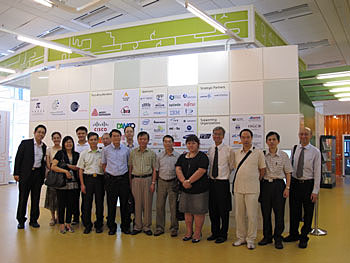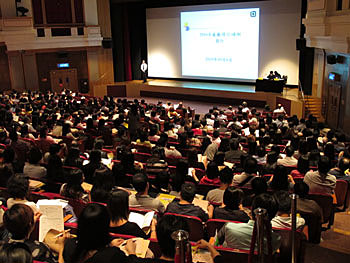Chapter 3 Labour Relations
The Programme of Labour Relations
www.labour.gov.hk/eng/labour/content.htmIn Hong Kong, employer and employee relations are largely premised on the freely negotiated terms and conditions of employment entered into between the two parties. Employers and employees in Hong Kong are free to form trade unions and participate in union activities. The objective of the Labour Relations Programme is to maintain and promote harmonious labour relations in the non-governmental sector. We achieve this by:
- giving advice on matters relating to conditions of employment, provisions of the Employment Ordinance (EO) and good people management practices;
- providing voluntary conciliation service to help employers and employees resolve their employment claims and disputes;
- promoting understanding of labour laws and encouraging good people management practices;
- adjudicating minor employment claims speedily through the Minor Employment Claims Adjudication Board (MECAB); and
- registering and regulating trade unions to bring about sound and responsible trade union administration.
The principal legislation administered by this programme area includes the EO, the Labour Relations Ordinance (LRO), the Minor Employment Claims Adjudication Board Ordinance (MECABO) and the Trade Unions Ordinance (TUO).
With the provision of a comprehensive set of employment standards, the EO is the main piece of legislation governing conditions of employment in the non-governmental sector. The procedures for settling labour disputes in the non-governmental sector are provided for in the LRO. The MECABO establishes the machinery known as the MECAB to adjudicate minor employment claims when settlement cannot be achieved by conciliation. For the regulation of trade unions, the TUO provides a statutory framework for trade union registration and administration.
Our Work and Achievements in 2010
Key indicators of Work
Some key indicators of work of the Labour Relations Programme Area are contained in Figure 3.1.
Amendments to the Employment Ordinance
In 2010, the EO was amended to introduce a new criminal offence, whereby an employer commits an offence if he wilfully and without reasonable excuse fails to pay any sum awarded by the Labour Tribunal or the MECAB that comprises wages and entitlements underpinned by criminal sanctions under the EO.
Conciliation and Consultation Services
Our consultation and conciliation services have contributed to the maintenance of industrial peace. In 2010, we handled 68 795 in-person consultations, 68 labour disputes and 20 434 claims. Along with the recovery of the local economy, the number of labour disputes and claims handled in 2010 decreased by 16.1 per cent compared with the figure of 24 448 cases in 2009. In 2010, we attained a high level of settlement rate at 72.9 per cent. Three strikes were recorded in the year. The number of working days lost per thousand salaried employees and wage earners was 0.11, among the lowest in the world. (Figures 3.2 - 3.7)
Strengthening Tripartite Co-operation
To promote tripartite collaboration at the industry level with a view to fostering harmonious labour relations, nine industry-based tripartite committees have been set up in the catering, construction, theatre, logistics, property management, printing, hotel and tourism, cement and concrete as well as retail industries. These tripartite committees provide useful forums for representatives of employers, employees and the Government to discuss issues of common concern in the industries. Matters of concern to the industries such as statutory minimum wage, the Employment (Amendment) Ordinance 2010, Mandatory Provident Fund Schemes and other employment related issues were deliberated in the year.
Promotion of Good Employer-Employee Relations
To promote better public understanding of the EO and good people management practices, we organised various promotional activities such as seminars, talks and roving exhibitions for employers, employees, human resources professionals and members of the public. A wide range of publications covering different themes were produced for free distribution to the public. Relevant information is also disseminated through the department's website and the media. To tie in with the implementation of the Employment (Amendment) Ordinance 2010, we carried out a series of promotional activities including producing relevant publications and organising large-scale briefings. Besides, to raise the public awareness on the differences in the rights and benefits under EO between an employee and a self-employed person, a new TV Announcement in the Public Interest was launched in October 2010.
We organised a number of experience-sharing sessions and briefings for human resources practitioners through our network of 18 Human Resources Managers Clubs. In the year, five roving exhibitions on the EO and good people management measures were also organised over the territory attracting some 14 600 visitors.
Adjudication of Minor Employment Claims
The MECAB provides a speedy, informal and inexpensive adjudication service to members of the public. It is empowered to determine employment claims involving not more than 10 claimants for a sum not exceeding $8,000 per claimant.
In 2010, the board recorded 2 067 claims amounting to $8,807,004 and concluded 2 112 claims with a total award of $4,874,822.
Regulation of Trade Unions
The Registry of Trade Unions is responsible for the promotion of sound and responsible trade union administration, and is entrusted with the statutory duty to register trade unions, process and register their rules, examine their annual audited statements of account, and conduct inspection visits to trade unions to ensure that they comply with the TUO.
In 2010, three new trade union federations and 18 new trade unions were registered, making up a cumulative total of seven registered trade union federations and 824 registered trade unions (comprising 780 employee unions, 18 employers' associations and 26 mixed organisations of employees and employers). Please refer to the following webpage for the key trade union statistics: www.labour.gov.hk/eng/labour/content3.htm
In the year, the Registry of Trade Unions examined 767 statements of account and conducted 379 inspection visits to trade unions to ensure that their administration and financial management were in compliance with the TUO. To facilitate trade union officers in acquiring knowledge of union law and management, the Registry organised three courses on trade union bookkeeping, auditing and provisions of the TUO.

